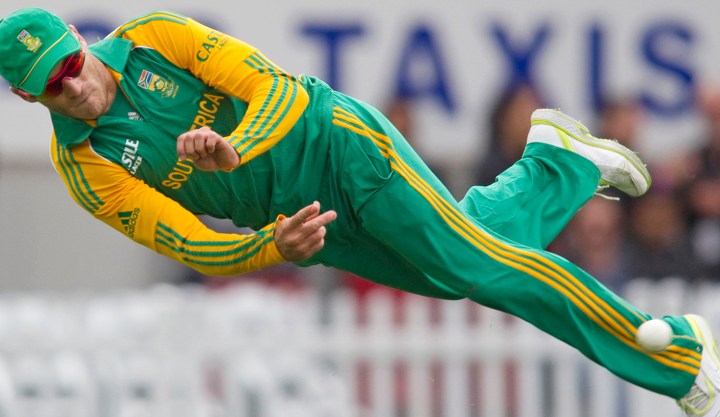Sport
Cricket: Of 20/20 hindsight, what-ifs, and why-nots

The Proteas returned home to South Africa after exiting the World T20 in the semi-finals, but this time it was different. Coach Russell Domingo and skipper Faf du Plessis were made to justify tactics rather than an inexplicable loss of brain function. It’s an improvement, but the sense of what-if remains strong. By ANTOINETTE MULLER.
Playing sport at international level for South Africa is a brutal task. One day players are the cock of the walk, the next, a feather duster. In a sports-mad country, there is always expectation, be it good or bad. The recently-concluded ICC World T20 was no different.
With South Africa’s history in this sort of event, the expectations from most of the public would have been the worst. Their T20 record leading up to the event was so-so, having played eleven, winning five and losing six, which included a series win in Sri Lanka, but the squad tasked with the global event came unstuck against Australia right before they were due to jet off. Beaten in a seven-over-a-side farce and walloped in a 20-over game at Centurion raised many eyebrows. But that all changed just two games into the tournament. After losing to Sri Lanka, South Africa held their nerve for a thrilling win against New Zealand, eked out a win against the Dutch and got over the line against England. The run of events eased them into the semi-final, where 170 was not enough to beat India. If you’d told coach Russell Domingo that would be the case at the start of the tournament, he’d have taken it.
“We were always going to be judged on how the last game went. If you told us at the start of the tournament we would have 170 to defend in the semi-final, I’d have taken it. We were quietly confident going into the tournament. We’ve played some good cricket over the last few months. We’ve developed a good strategy and a good playing style and we’ve had success against Sri Lanka in Sri Lanka and against Pakistan in the UAE,” Domingo said.
After three tight wins and a consistent response to pressure, expectation started to rear its head once more. Some of that expectation surrounded AB de Villiers’ role. It was one of the most debated points of South Africa’s campaign. Against England, when batting at number three, he scored a breathless 69, but De Villiers never batted in that position again. For Domingo, it’s a frustrating situation.
“The AB conundrum is a tiring one. He’s batted at three and had limited success. It’s not the number he bats in, it’s the situation he comes in. When we get off to a good start and he walks in after 13 overs, people will criticise us because he doesn’t get enough time to bat and if we don’t get a poor star, we get abused for not getting a good start.”
The coach is right. His average batting at number three is low and Domingo insists that he is most effective when the game has been set up for him and does not want his team strategy to depend on one or two individuals.
“People probably want AB to bat for 120 balls and Dale (Steyn) to bowl 120 balls. That ain’t going to happen. We have 11 very good cricketers and we are not dependent on one player,” Domingo said.
Another sticking point was the use – or inclusion – of Albie Morkel. Having not played international cricket for over a year and having not really set the domestic scene alight either, Morkel was included as a pinch-hitting all-rounder. He ended up being a player who opens the bowling and who floated around the batting order. It’s a frustrating dilemma for the coach who admits he feels some of the criticism the side has received for its tactics has been unwarranted.
“Once again, we are criticised when Albie faces 12 balls and criticised for changing the batting order if he walks in with more overs to go. It’s a Catch 22. He was earmarked to hopefully bowl one or two overs and face ten balls at the end. We feel like there is a lot of unfair criticism to what’s happened. I think we’ve been playing really good cricket for a period of time with the way the team has been set up,” Domingo said.
Morkel and JP Duminy shared the new ball in the semi-final, with Duminy’s first over going for 14 runs. Managing the bowlers has been a tricky task since very few have been consistent. Duminy’s first over against New Zealand conceded just seven runs while Steyn was carted for 17 in his opening over against Sri Lanka.
Much of the criticism around tactics centred around not going for the jugular upfront against India and not using Steyn to open the bowling, but much of it was in hindsight and in line with the way South Africa had decided they would approach Powerplays.
“Dale can only bowl four overs and we have to set up our Powerplay as best we can. We need him in the middle and we need him at the back. In T20, batsmen tend to target overs four, five and six and I’d rather have somebody like Dale bowling there. Hindsight is a great sight; if we knew JP was going to go for 14 runs, we would not have bowled him,” said Domingo.
Now that it’s all done and dusted, hindsight bias is taking over the dissection of the campaign and while it’s easy to nitpick tactics and selection, it’s still a far cry from tournaments past where players and coaches had to try and explain the phenomena of succumbing to pressure.
The biggest positive that South Africa will take from the tournament is their ability to play under pressure in an ICC event. Right from defending seven off the final over, chasing a total to not losing their heads in a knockout match, South Africa as a limited overs unit looks much improved.
Still, as with all incidents gone by, the lingering “what if” will always be there. What if an in-form all-rounder like Justin Kemp were selected instead of Albie Morkel? What if there were a specialist death bowler like Kyle Abbot on call? What if De Villiers had come in ahead of Duminy in the semi-final? What if foresight was 20-20 instead of hindsight?
Luckily for South Africa, the T20 format, at least internationally, remains somewhat subdued in terms of its relevance and, for the time being at least, it must be a relief to be focusing on the “what ifs” instead of the “why nots”. DM
Photo: Faf du Plessis throws at the stumps to dismiss Kane Williamson during the final one-day cricket international against South Africa, in Auckland, March 3, 2012. REUTERS/Nigel Marple




















 Become an Insider
Become an Insider